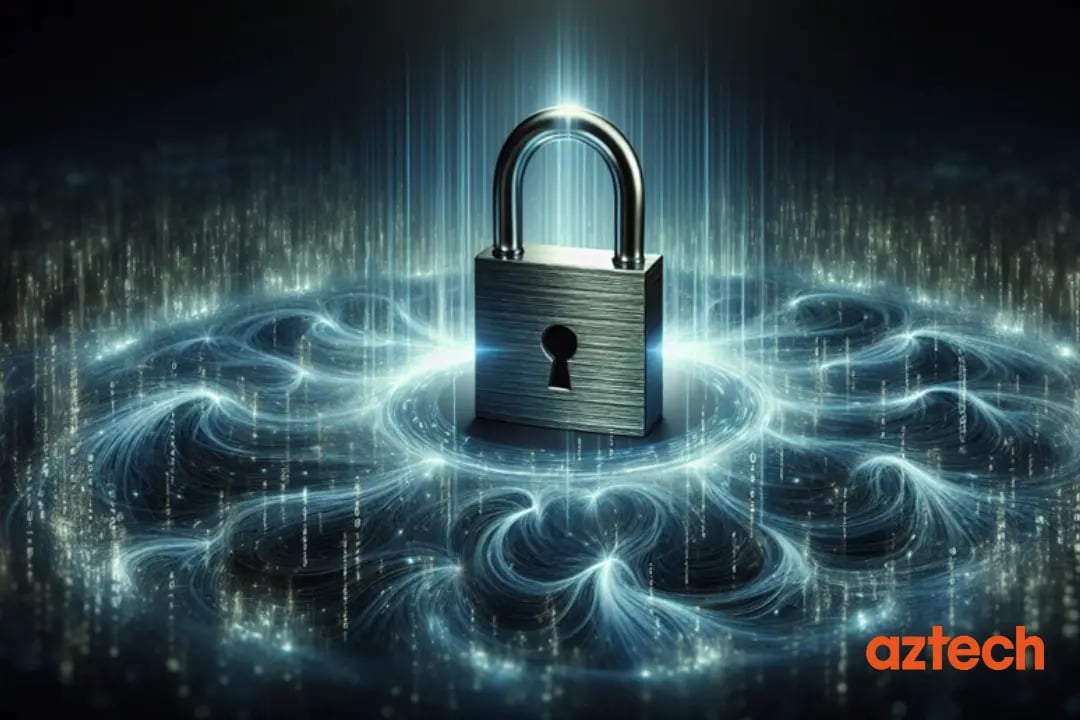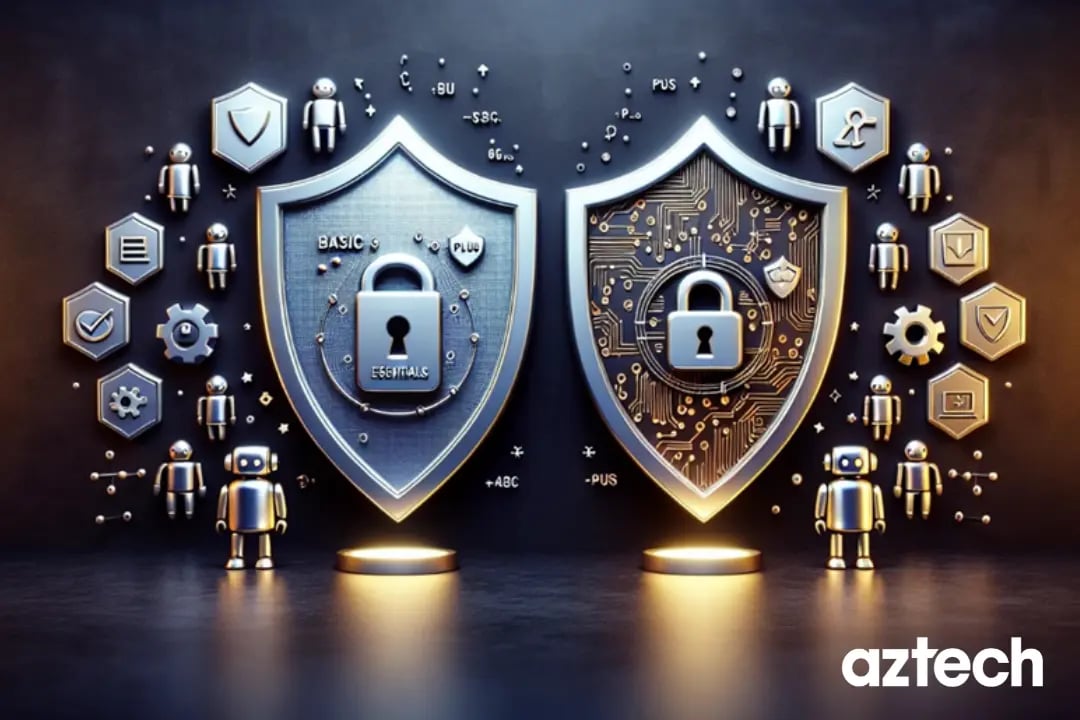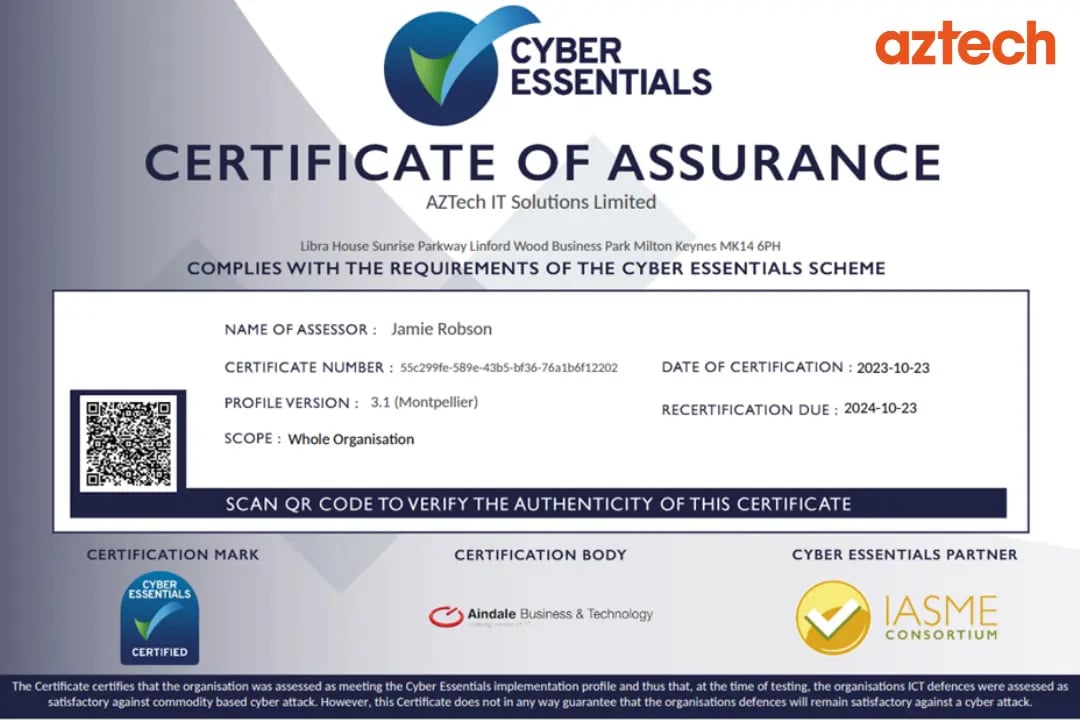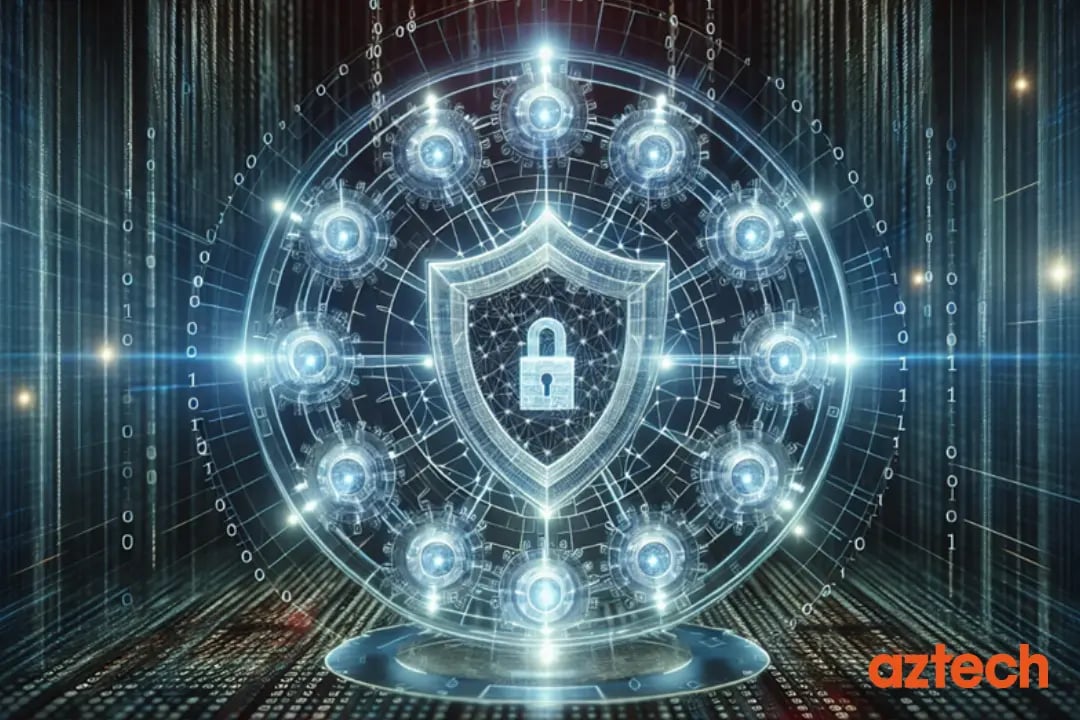In today’s digitally connected world, cyber security has become a top priority for businesses of all sizes. Cyber threats are constantly evolving, and even the most robust security measures can be vulnerable to new attacks.
This is where Cyber Essentials comes into play, providing companies with a clear path to strengthen their digital security and protect against the majority of common cyber threats like phishing attacks, malware, ransomware etc.
Read on to discover how this UK government backed scheme can benefit your business, and how to navigate the certification process with confidence.
Key Takeaways
- Cyber Essentials provides organisations with a self-assessment tool to identify and address potential vulnerabilities in their cyber security.
- Obtaining the Cyber Essentials certification offers competitive advantages such as customer trust, protection against cyber threats, and enhanced security.
- Organisations can achieve this certification by following an assurance framework that includes self-assessment, technical audit and verification, and ongoing maintenance of security controls.
| Read More: Changes to Cyber Essentials 2025 |
Understanding Cyber Essentials and Its Importance

What are Cyber Essentials?
In simple terms, Cyber Essentials is a UK government backed scheme designed to protect organisations from basic cyber-attacks and give businesses the opportunity to demonstrate their commitment towards cyber security.
Developed and operated by the National Cyber Security Centre (NCSC), the Cyber Essentials scheme outlines five basic security controls that can safeguard organisations from the most common cyber-attacks.
In fact, approximately 80% of cyber-attacks can be averted by utilising at least one of the five controls mandated by Cyber Essentials, effectively reducing the risk of cyber-attack.
In a world where cyber threats are a constant concern, having Cyber Essentials offers several benefits:
- Helps to protect your organisation
- Increases customers' trust
- Attracts new businesses
- Improves your organisation’s cyber security level
| Read: Why Does My Business Need Cyber Essentials? |
The Genesis of the Cyber Essentials Scheme
Established in 2014, the Cyber Essentials Scheme was introduced by the UK government to help organisations defend against the most common cyber-attacks like phishing attacks.
The Cyber Essentials scheme aimed to provide a cost-effective and basic level of cybersecurity through a set of five technical controls via technical audit.
Over time, the scheme has been updated to reflect the changing landscape of cyber-attacks, ensuring that organisations of all sizes are equipped with the necessary cyber security measures with tools and resources to boost their digital security.
Organisations that adhere to the guidelines of the Cyber Essentials Scheme can implement a concise set of controls. These controls are designed to protect and diminish the risk of cyber-attacks.
The scheme’s effectiveness has been recognised by National Cyber Security Centre (NCSC), and it continues to be a valuable resource for businesses looking to enhance their cyber security posture.
| Read: The Latest Cyber Essentials Scheme Changes |
Why Your Business Needs the Cyber Essentials Certification
Securing a Cyber Essentials certification proactively protects an organisation’s sensitive data and systems. With a straightforward and easy process, it provides clear benefits, such as boosting customer confidence and staying protected against cyber-attacks.
Also, organisations involved in transferring or producing Ministry of Defence Identifiable Information (MODII) often require this certification, underlining its relevance across different industries.
By becoming Cyber Essentials certified, it allows your business to:
- Exhibit its dedication to uphold robust cyber security measures
- Enhance customers trust
- Open up new business opportunities
- Elevate the overall cyber security level
In an era where cyber-attacks are constantly evolving, becoming cyber essential certified can provide a competitive edge and help ensure the ongoing protection of your organisation’s valuable data and systems from the cyber-attack attract.
The Two Tiers of Cyber Essentials: Basic and Plus

Cyber Essentials offers two certification levels to accommodate the varying needs and resources of organisations, ultimately aiming to improve an organisation’s cyber security level: Basic and Plus.
The Basic level provides protection against the most common cyber-attacks and requires a self-assessment questionnaire, while the Plus level offers a more comprehensive approach, including hands-on technical verification and additional security measures.
The upcoming sections will provide a detailed analysis of the differences between these two certification tiers and the respective processes involved in attaining each level.
The Core of Cyber Essentials
The self-assessment option of Cyber Essentials provides protection against a range of common cyber-attacks, giving organisations a sound foundation to build upon in their digital security journey.
To obtain the Cyber Essentials Basic certification, organisations must complete a self-assessment questionnaire on the IASME website, which covers evaluating the security controls and practices in place, such as:
- Firewalls
- Secure configuration
- User access control
- Malware protection
- Patch management
This initial self-assessment helps organisations identify any potential vulnerabilities and areas for improvement in their security.
The assessment should be completed prior to advancing to Cyber Essentials Plus, within a 3-month period following the successful completion of the Basic level.
Addressing identified weaknesses and upholding the required controls will help your business establish a robust cyber security foundation, setting the stage for Cyber Essentials Plus certification.
Advancing with Cyber Essentials Plus
A Cyber Essentials Plus certification represents a higher level of commitment to cyber security, involving a technical audit and additional security measures to ensure the highest level of protection.
The main difference between Cyber Essentials and Cyber Essentials Plus is the level of assessment and assurance provided by each certification, with the Plus level featuring rigorous testing of systems and processes, such as vulnerability scanning and a technical audit.
Obtaining a Cyber Essentials Plus certification involves the following steps:
- Work with a Certification Body to apply for an online assessment account.
- Complete a self-assessment certification.
- The Certification Body evaluates the assessment to determine if the business meets the requirements or not.
Progressing to Cyber Essentials Plus enables your business to attain an increased assurance of its security posture. This not only enhances your reputation among customers but also showcases your commitment to safeguarding against cyber-attacks.
Achieving the Certification: The Path to Being Cyber Essentials Certified

The certification process for Cyber Essentials involves self-assessment, technical audits and verification, and the maintenance of security controls over time.
By following this assurance framework, organisations can ensure they are equipped with the most up-to-date security measures and are prepared to respond effectively to evolving cyber-attacks.
The upcoming sections will provide an in-depth discussion of the specific steps involved in the certification process for both Cyber Essentials Basic and Plus levels.
Self-Assessment: Starting Your Journey
The initial step towards your Cyber Essentials certification involves completing a self-assessment questionnaire, evaluating your organisation’s compliance with the scheme’s requirements.
This questionnaire is designed to help you understand the questions and take notes on your organisation’s current setup, acting as a critical step in the certification process.
Upon completion and submission of the self-assessment questionnaire, you must provide relevant evidence to support your answers and adhere to the Cyber Essentials requirements in order to receive a certificate of compliance.
Assessors for the Cyber Essentials self-assessment stage include cyber-security experts, such as Aztech IT Solutions, ID Cyber Solutions, Ascentor, and certified assessors from IASME.

These professionals can help guide your organisation through the questionnaire and ensure you are well-equipped to meet the scheme’s requirements.
Technical Verification: Securing Cyber Essentials Plus
Technical audits and verification for Cyber Essentials Plus includes internal vulnerability scans and tests of the in-scope system(s) and the self-assessment questionnaire.
Internal vulnerability scans involve inspecting the internal network to identify connected devices, performing authenticated vulnerability scanning of representative user endpoints, and verifying that devices and software are not exposed to known threats.
In addition to vulnerability scans, the Cyber Essentials Plus certification requires organisations to provide mobile screenshots and multi-factor authentication evidence as part of the technical verification process.
By completing these steps, organisations can demonstrate their compliance with the scheme’s requirements and obtain the highest level of certification, showcasing their commitment to maintaining robust digital security.
Cyber Security Measures in Place: What a Certification Entails

Cyber Essentials certifications require organisations to implement specific security measures, including firewalls, secure configuration, and malware protection.
These controls form the foundation of an organisation’s cyber security strategy, helping to protect against common cyber threats and maintain a secure digital environment.
The subsequent sections will offer a detailed examination of each of these security measures and their roles in achieving a Cyber Essentials certification.
Guarding Against Unauthorised Access
Implementing access controls is essential in preventing unauthorised access to sensitive and personal information, as well as other sensitive data and systems.
By controlling who can access data and services, as well as the level of access they have, organisations can safeguard their digital assets and maintain the confidentiality, integrity, and availability of their information.
Cyber Essentials certifications requires organisations to establish separate accounts for each user, with no shared accounts, and provide each user with a unique user ID and password to access the system.
To effectively manage user privileges according to Cyber Essentials standards, organisations should:
- Develop appropriate identity and access management policies and processes
- Consider implementing multi-factor authentication for all user accounts
- Implement a user account management system and privilege management process
By taking these steps, organisations can minimise the risk of unauthorised access and ensure the ongoing security of their digital assets.
Defending Your Digital Perimeter
Establishing a strong digital perimeter with firewalls and routers is a critical component of cyber security, as these measures control incoming traffic and protect against cyber attacks.
Firewalls and routers act as a barrier between an organisation’s IT network and other networks, filtering and blocking suspicious traffic and implementing access control policies to help safeguard the network and computers from potential hackers.
In addition to firewalls and routers, Cyber Essentials certifications also require organisations to conduct deep packet inspection, enforce secure communication protocols, and log and analyse network activity.
By implementing these measures, organisations can effectively defend their digital perimeter and maintain a high level of security against cyber attacks.
Keeping Malware at Bay
Utilising anti-malware software and trusted applications is a key component of Cyber Essentials and helps organisations maintain a secure digital environment.
Anti-malware software detects, prevents, and removes malware and viruses from computer systems, scanning the operating system, files, and emails to eliminate threats and safeguard the device.
Trusted applications, on the other hand, ensure that the software being used is legitimate and free of malicious code.
By using trusted applications, users can significantly reduce the likelihood of downloading and installing malware onto their devices.
Cyber Essentials recommends organisations utilise anti-malware software, such as Panda Adaptive Defense 360 (AD360), and regularly update their applications to stay protected against the latest threats.
Cyber Essentials in Action: Case Studies and Testimonials

Case studies and testimonials from organisations that have achieved the Cyber Essentials certification demonstrate the real-world benefits of this scheme.
For example, the Sightsavers case study highlights how the certification helped resolve security issues identified in an audit, while the CyberSet case study emphasises the organisation’s choice of a Cyber Essentials certification to address security concerns.
In addition to these case studies, testimonials from professionals such as Sara Ward, CEO of Black Country Women’s Aid, showcase the positive impact of the Cyber Essentials Plus certification on their organisations.
Partnering for Protection: Choosing a Cyber Essentials Partner
Working with a Cyber Essentials partner such as Aztech IT Solutions, IT Governance or IASME, can provide valuable guidance and support throughout the process.
These partners have the expertise and resources to help organisations navigate the certification process, ensuring they meet the scheme’s requirements and maintain compliance with industry standards.
When selecting a Cyber Essentials partner, it’s important to consider the following factors:
- Understanding your specific needs
- The partner’s certifications
- Their team’s expertise
- Their industry experience
By choosing a partner that aligns with your organisation’s goals and requirements, you can streamline the Cyber Essentials process.
The Broader Impact: Cyber Essentials and the Supply Chain
Becoming Cyber Essentials certified not only benefits your organisation but also has a broader impact on your supply chain.
The certification demonstrates your commitment to data security and cyber security within the supply chain, helping to secure both your organisation and its partners.
Implementing the required controls and defences against basic hacking and phishing attacks provides assurance to suppliers that your organisation has a strong cyber security posture, reducing the risk of the most common cyber-attacks and enhancing the overall security of the supply chain.
Without a Cyber Essentials certification, supply chains can become vulnerable to cyber breaches and security risks, making it essential for suppliers to be Cyber Essentials certified and demonstrate their dedication to cyber security.
By achieving the Cyber Essentials certification, organisations can strengthen their supply chain relationships and ensure that all partners are working together to maintain the highest standards of cyber security.
Cyber Essentials for Various Sectors
Different sectors can benefit from being Cyber Essentials certified, as it helps protect sensitive information and maintain compliance with industry regulations.
For example, in the government sector, the Cyber Essentials certification can improve security processes, build trust with customers, and make organisations eligible for government contracts.
Similarly, in the healthcare and finance sectors, a Cyber Essentials certification can help organisations increase competitiveness, save costs, and reduce operational risk.
By implementing the necessary controls and maintaining compliance with the Cyber Essentials scheme, organisations across various sectors can enhance and keep their cyber security measures in place.
Maintaining Compliance: Recertification and Updates
Consistent recertification and updates are indispensable in assuring organisations maintain compliance with Cyber Essentials standards and remain current with the latest cybersecurity measures.
The recertification process entails completing the self-assessment questionnaire and undergoing a new external assessment each year.
To prepare for recertification, organisations should:
- Review the requirements
- Conduct a gap analysis
- Update policies and procedures
- Perform a vulnerability assessment
- Train employees
- Implement security controls
- Conduct internal audits
- Document compliance efforts
By staying vigilant and proactive in maintaining compliance, organisations can continue to benefit from the protection and assurance offered by Cyber Essentials certification.
Summary
In conclusion, the Cyber Essentials certification provides organisations with a clear path to boost their digital security and protect against the majority of common cyber-attacks.
By implementing the scheme’s required security controls, businesses can demonstrate their commitment to cyber security and increase customer trust.
Whether your business operates in the public or private sector, the Cyber Essentials certification is a valuable investment in maintaining the highest standards of digital security and safeguarding your organisation’s valuable data and systems.
Frequently Asked Questions
What are the 5 Cyber Essentials?
The five Cyber Essentials are: Firewalls, Secure Configuration, User Access Control, Malware Protection and Patch Management. These five essential controls provide the foundation for effective cyber security management.
What is the Cyber Essentials scheme?
The Cyber Essentials scheme is a UK government-backed initiative supported by the National Cyber Security Centre (NCSC), designed to promote cybersecurity best practices among businesses.
Is Cyber Essentials worth having?
Cyber Essentials provides advice, support, and education for businesses of all sizes, enabling them to make their company more secure and stand out in a positive light with their customers. As such, we believe Cyber Essentials is worth having.
How often should Cyber Essentials certification be renewed?
Cyber Essentials certification should be renewed annually for optimal protection.

-1.png?width=552&height=678&name=text-image%20module%20desktop%20(4)-1.png)


.png?width=2000&name=Case%20study%20(21).png)


-2.png?width=422&height=591&name=text%20image%20tablet%20(31)-2.png)






